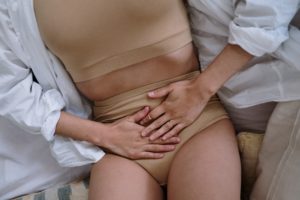What is Painful Bladder or Interstitial Cystitis?
Interstitial cystitis (IC) is a chronic inflammatory condition of the bladder. The actual cause of IC is unknown, and it does not respond to conventional antibiotic therapy like common cystitis, also known as urinary tract infection. IC can affect people of any age, sex, or race. It is, however, more prevalent in women. Recent studies suggest that there may be 1,000,000 or more cases in the United States.
The most common symptoms of interstitial cystitis are urinary frequency during the day or night; urgency, which is the sensation of having to urinate immediately and may also be accompanied by pain, pressure, or spasms; and pain, which can be located in the lower abdomen, urethral, or vaginal areas. Pain can also be associated with sexual intercourse. Men who have IC may experience pain in the testicular and/or scrotal areas and may have pain during ejaculation. Interstitial cystitis has unexplainably been associated with certain other chronic diseases and pain syndromes, such as vulvar vestibulitis, fibromyalgia, and irritable bowel syndrome.

Most patients with IC have a difficult time getting a diagnosis. There are several steps that need to occur in order to recognize IC. It is known as a disease of exception. Your provider will need to rule out any urinary tract infection by culturing a urine sample, preferably a catheterized sample.
Other diseases and conditions that may have symptoms resembling IC also need to be ruled out. These are kidney problems, tuberculosis, vaginal infections, bladder cancer, sexually transmitted diseases, radiation cystitis, and neurological disorders.
A cystoscopy with hydrodistention under general anesthesia is also needed to stretch the bladder enough to see the pinpoint hemorrhages on the bladder wall that are the hallmark sign of interstitial cystitis. A routine cystoscopy done in the office may be too painful for patients with IC, and those hallmark hemorrhages cannot be fully evaluated. Sometimes, a bladder wall biopsy is needed to rule out other diseases and assist in the diagnosis.
At this time, there is not a cure for IC, nor is there an effective treatment which works for every patient. However, a vast majority of IC patients are helped by one or more of the following treatments.
Oral medication called Elmiron® that is taken on an empty stomach, three times a day. It is the only FDA-approved oral medication that is specific for IC. It works by helping to repair the thin or damaged bladder lining. Other oral medications that have been used include tricyclic antidepressants, such as amitriptyline, anti-inflammatory agents, antispasmodics, antihistamines, muscle relaxants, and bladder analgesics.
Bladder distention is performed by filling the bladder with water under general anesthesia. This may provide some relief of pain. DMSO bladder instillations are placing this medication, dimethyl sulfoxide, directly into the bladder. It is thought to work as an agent that reduces inflammation, which reduces pain. DMSO can be mixed with steroids, heparin, and/or local anesthetics as well. Heparin has both anti-inflammatory and surface protection actions.
Diet has a huge impact on the severity of IC symptoms. Foods and beverages that are acidic and spicy may cause symptoms to flare. Beverages such as tea, coffee, and alcohol may also irritate the bladder.
Physical therapy may be an option for IC patients to relax their pelvic floor muscles and avoid overly stressing them. Many people with IC have problems with this group of muscles and develop a condition called pelvic floor dysfunction. This can also lead to pain with sexual intercourse.
Sacral nerve stimulation implants can also be used to treat urinary incontinence, urgency, and frequency. These symptoms can also be made worse with IC flare ups. New therapies are being researched to help with the treatment and understanding of interstitial cystitis.
The effect of IC on an individual’s life should not be underestimated. IC can be debilitating and may cause the patient to experience feelings of helplessness, despair, and depression. The Interstitial Cystitis Association is a non-profit organization that works internationally on behalf of all IC patients to provide a support network, advocate in the public and private sectors for research funding, promote and provide research funding to find effective treatments and a cure for IC and to provide the most comprehensive and up-to-date information on IC.
